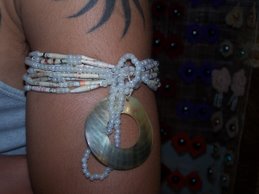
University of Sto. Tomas (UST), for the third year, sent 6 industrial design students to our office for an On-the Job Training.
Hopefully, the 2 months program will equip them with new knowledge and skills necessary in product development and design, visual merchandising and product research. But above anything else, our organization would like them to widen their perspectives and to somehow change the way they view things---that on top of achieving their personal career goals and acquiring superb technical skills, they should go back to the very basic question--"who will benefit from the products that they designed?, that in the process of producing, patronizing, and consuming, what's really at stake?
We want them to become better designers. Designers with a social and environmental perspective, a mindset that puts creativity and innovation to appropriate use.
Strategic Rationale:
APFTI recognizes that the youth sector plays an important role in mainstreaming the practices and principles of Fair Trade. With that, the organization’s Accelerated Market Access for Community Enterprises (AMACE) necessitates the formation of a Fair Trade Youth Network that would spawn youth advocates that can possibly take vital roles in the advocacy of Fair Trade. The youth sector can act as a campaigner, coordinator, and possibly act as a co-participant in the various Fair Trade initiatives in the Philippines.
Specific Objectives:
1) Involve the industrial design students to the advocacy of Fair Trade, by giving them a chance to directly work on APFTI’s programs and services, addressing the needs of its partner-producers, particularly on the aspects of product development, visual merchandising and market research.
1.1 Influence design students to integrate social responsibility in the practice of their craft, and introduce to them alternative career paths, such as that of designing for Fair Trade producers and organizations.
1.2 Facilitate the formation of an academe-based Fair Trade Design group that will conduct awareness-raising activities to their campus and will link up with other student groups (from other fields), which are already involved in Fair Trade.
2) For APFTI to completely adopt a pro-active learning culture by securing its ties with academic institutions, and gaining new-fangled information from students on the organization’s areas of specialization (for this activity, focusing on the aspect of product development and design.)
APFTI recognizes that the youth sector plays an important role in mainstreaming the practices and principles of Fair Trade. With that, the organization’s Accelerated Market Access for Community Enterprises (AMACE) necessitates the formation of a Fair Trade Youth Network that would spawn youth advocates that can possibly take vital roles in the advocacy of Fair Trade. The youth sector can act as a campaigner, coordinator, and possibly act as a co-participant in the various Fair Trade initiatives in the Philippines.
Specific Objectives:
1) Involve the industrial design students to the advocacy of Fair Trade, by giving them a chance to directly work on APFTI’s programs and services, addressing the needs of its partner-producers, particularly on the aspects of product development, visual merchandising and market research.
1.1 Influence design students to integrate social responsibility in the practice of their craft, and introduce to them alternative career paths, such as that of designing for Fair Trade producers and organizations.
1.2 Facilitate the formation of an academe-based Fair Trade Design group that will conduct awareness-raising activities to their campus and will link up with other student groups (from other fields), which are already involved in Fair Trade.
2) For APFTI to completely adopt a pro-active learning culture by securing its ties with academic institutions, and gaining new-fangled information from students on the organization’s areas of specialization (for this activity, focusing on the aspect of product development and design.)

No comments:
Post a Comment